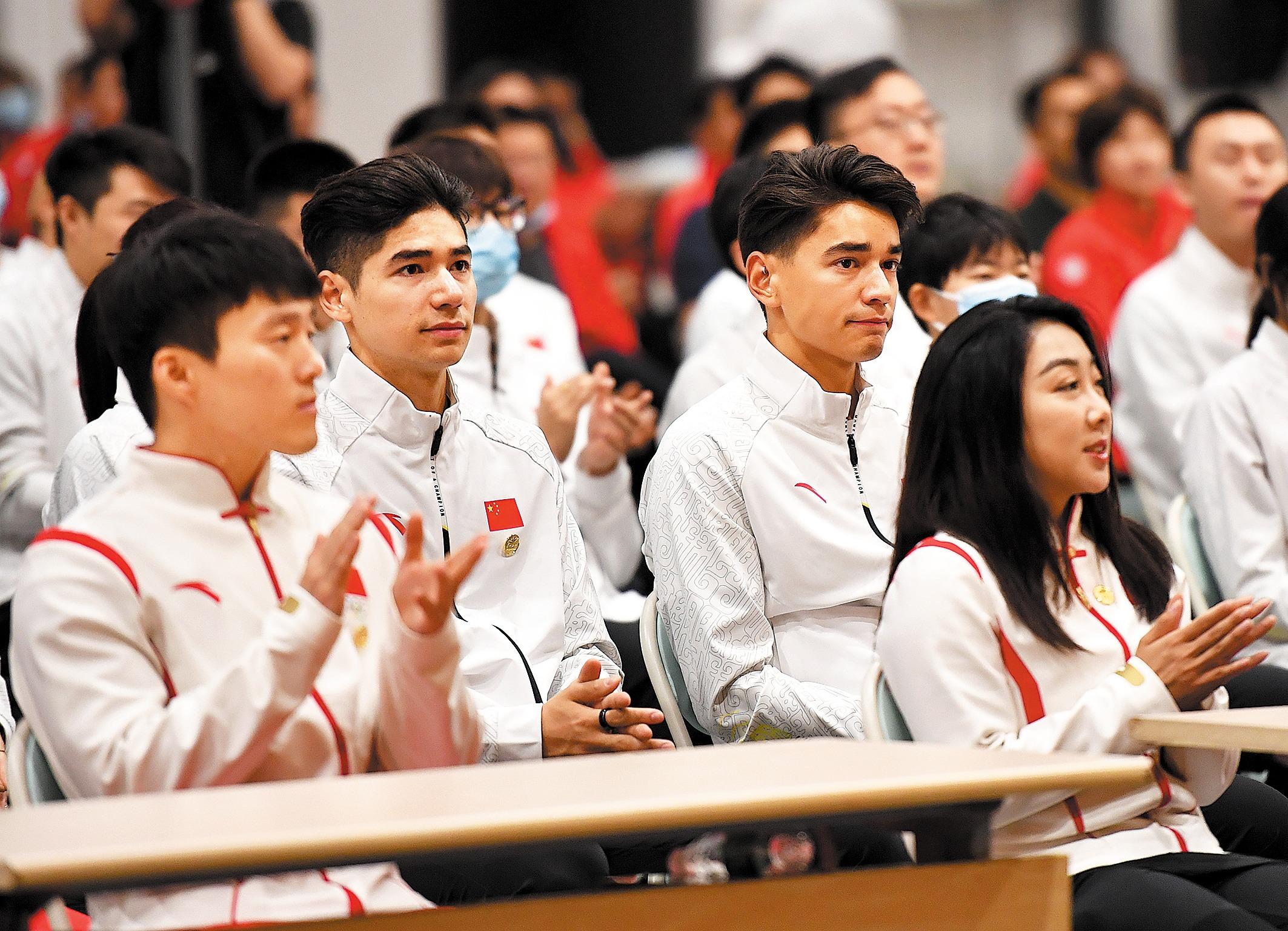Team China marks 1,000 days to Milan Games, aims to build on Beijing 2022’s best-ever medal haul
 From left: Olympic champions Qi Guangpu, Liu Shaoang, Sandor Liu Shaolin and Sui Wenjing attend an event in Beijing on May 13 to mark the 1,000-day countdown to the 2026 Winter Games. (PHOTO / XINHUA)
From left: Olympic champions Qi Guangpu, Liu Shaoang, Sandor Liu Shaolin and Sui Wenjing attend an event in Beijing on May 13 to mark the 1,000-day countdown to the 2026 Winter Games. (PHOTO / XINHUA)
Fresh from delivering the nation’s best-ever Winter Olympic campaign at home, China’s winter sports teams are refusing to rest on their laurels as they target more glory at the 2026 Games.
A mobilization meeting in Beijing on May 13 kicked off the 1,000-day countdown to the Milan and Cortina d’Ampezzo Games, with motivational speeches from Olympic champions, coaches and sports officials underlining China’s ambitions for more breakthroughs across a wider range of events in Italy.
Despite achieving a best-ever medal haul at the home Games last year, China still has a long way to go to become an all-around powerhouse in winter sports, stressed sports minister Gao Zhidan.
“Our overall competitiveness in winter sports is not strong enough, and the same can be said for the depth of our reserve talent in many sports. It’s a big challenge for us to improve our performances in 2026,” said Gao, who was appointed minister of the General Administration of Sport of China last August.
“We have to prove to the world that the success of Beijing 2022 wasn’t a one-off, that we remain committed to the sustainable development of winter sports ...”
Maintaining China’s traditional strength in skating events and making solid progress in snow sports such as snowboarding and freestyle skiing, the host delegation bagged 15 medals, including nine gold, at Beijing 2022. That was China’s best result since making its Winter Olympic debut at the 1980 edition in Lake Placid, New York, the United States.
Beijing 2022’s success triggered massive public interest in winter sports nationwide. Over 346 million Chinese people participated in ice and snow activities in the build-up to the Games, earning high praise from the International Olympic Committee.
Now it’s time to build on that legacy even further, urged Ni Huizhong, director of the National Winter Sports Administrative Center.
“We cannot dwell on the success of Beijing 2022 and past glories,” said Ni.
“The progress of youth development in some of our strength events remains slow. We still rely heavily on foreign coaching in most of the snow sports and we are far from being competitive on the world stage in more mainstream events such as cross-country, biathlon and Alpine skiing.
“There are gaps between us and the world’s winter sports powers which we need to keep working on with consistent effort and unwavering commitment.”
With several veteran athletes taking a break from competition this past season, the lackluster performances of China’s figure skating and freestyle skiing aerials teams — two of the host’s most successful programs at Beijing 2022 — highlighted the lack of youth development in these sports, Ni stressed.
During the 2022-23 season, China’s winter sports teams won 14 gold medals in total at world championships and World Cup series — almost equaling the outcome of the 2018-19 season, the first year of the Beijing 2022 Olympic cycle, according to the administrative center.
As the country’s most decorated winter sports program, the short-track speed skating team, led by new coach Zhang Jing, remains the biggest contributor after winning 19 medals, including six gold, this past season.
China’s short-track medal hopes have been further enhanced by the additions of Hungarian-born Olympic champion brothers Sandor Liu Shaolin and Liu Shaoang, who completed the naturalization process in March.
The Liu brothers are the latest talents to be recruited as part of a program initiated before Beijing 2022 to bolster the country’s competitiveness in winter sports.
Former South Korean national team short-track speed skater Lin Xiaojun, aka Lim Hyo-jun, completed his first international season representing China after changing nationality in 2021. In a strong return to competition, Lin won back-to-back 500m gold medals at the short-track World Cup series in February.
With China reopening its borders in the post-pandemic era, a packed schedule of international events on the 2023-24 calendar will provide Chinese athletes with more elite-level tests at home.
The International Skating Union’s long-track and short-track speed skating World Cup legs, scheduled respectively for Nov 17-19 and Dec 8-10, and the figure skating grand prix final, planned for Dec 7-10, are among the international events already confirmed.
Ji Dong, coach of the national freestyle skiing aerials team, welcomed the return of international tests and pledged to take full advantage of Beijing 2022’s legacy to maintain the momentum in Italy.
“It sounds quite far away, but there are actually only two more winters until the Olympic season opens in 2025,” said Ji, who helped Xu Mengtao and Qi Guangpu finish on top of the women’s and men’s aerials podiums at Beijing 2022.


